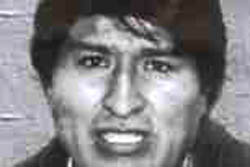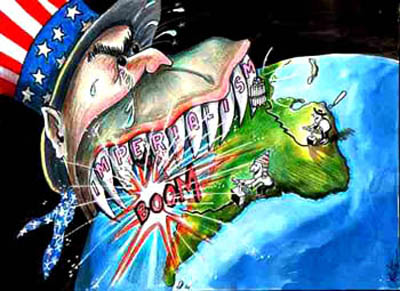 |
International Affairs
Bolivia's Socialist Party
Records Enormous Growth
Atila Sinke Guimarães
On December 5, 2004, mayors of 327 cities were elected in municipal elections of Bolivia. The results reveal an enormous growth in importance of the Movement Toward Socialism – MAS.
These city elections represent a defeat for the traditional parties and a triumph for the left. According to Green Left Weekly, MAS took around 280 of 327 cities, even though it did not win in any of the 10 main cities. Yet in those cities, the situation is not secure. Consider that it came second — with around 20% of the vote — in both the capital La Paz, and in El Alto, whose population was decisive in ousting the president during the October 2003 uprising. In Potosi, capital of a southern state rich in silver mines, MAS did not win, but the elected mayor is from a party inspired by the thinking of Ché Guevara, the famous guerrilla leader who was second to Fidel Castro in the Cuban revolution.

Evo Morales - Aymara Net |
In October 2003, Bolivia was the theater for a populist-leftist insurrection against President Sanchez Lozada, allegedly for his policy of selling Bolivian gas to the United States. The violent riots that shook the whole country obliged Lozada to renounce the presidency and flee Bolivia. He was replaced by vice-president Diego Mesa, sympathetic with the rioters. The principal leader of the insurrection was Evo Morales, a key figure of MAS. Morales, by the way, was defeated by Sanchez in the 2002 elections by a narrow margin of the vote (22.5% to 20%).
MAS is composed primarily of cocaleros (the native coca growers), mine workers, and peasants. It is supposed to represent the 69 indigenous peoples who make up 80% of Bolivia’s 9.3 million population. In the 1999 municipal elections, MAS took only 3% of the vote. Three years later, in the 2002 presidential elections, the MAS candidate Morales had 20% of the vote. The BBC estimates that in the 2004 elections, MAS got 25% of the ballots cast; Green Left estimates the number at 30%. It is a considerable percentage in a vote divided among 17 political parties with 28% of voters abstaining.
The rapid rise of MAS, an implacable foe of the United States, represents a rejection of neo-liberal policies and a general defeat for the establishment parties of Bolivia. The political situation born from these elections projects a future 2007 presidential race between Evo Morales, who would bring under his banner all the leftist forces, and the neo-liberal candidate Jorge Quiroga. Should nothing change on the panorama, the country could well experience what happened in Brazil, i.e, put a Communist worker in the presidency.

Along with Brazil, Bolivia dynamites the teeth of American Imperialism. This is what the MAS plans to do in the 2007 presidential elections - Agencia Prensa Rural, October 27, 2003 |
Before the recent elections, Morales made this prediction at the final MAS rally: “The time is approaching when we Bolivians will be able to govern ourselves, without programs imposed by the IMF [International Monetary Fund] and without corruption.” Morales emphasized “his solidarity with Cuba and Venezuela and with the anti-neo-liberal movements that have risen up in Brazil and other Latin American nations” (Green Left Weekly, December 15, 2004; BBC News, December 6; Inter Press Service, December 6; Prensa Latina, November 30 and December 6, 2004 – all online editions).
It is difficult to understand why the West remains oblivious to this new Communist invasion of South America. It seems that those in the United States who want to defend the remains of Christendom against Communism should be wasting no time in asking what to do in face of the rapid transformation of South America into a red continent.

Posted January 7, 2005
|
International Affairs | Hot Topics | Home | Books | CDs | Search | Contact Us | Donate

© 2002- Tradition in Action, Inc. All Rights
Reserved
|
 |
|